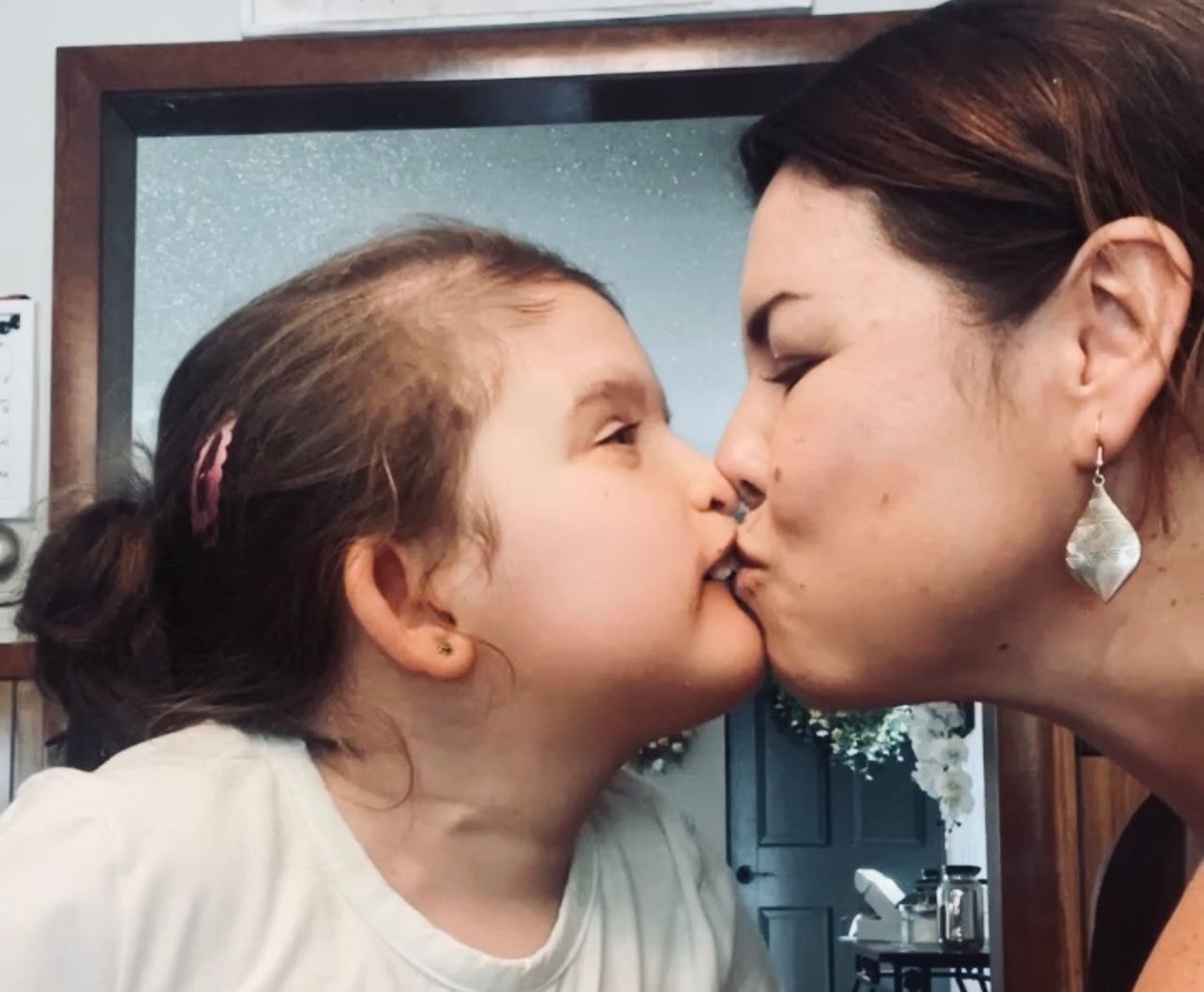
Parent Carer Collective: Natalia Bayona Frost
by Hibi
Feb 22, 2024
Is it possible to practise self-care on no sleep? This parent carer makes it happen – and she’s helping other families in the process.
When Natalia moved to the US from Colombia, she planned to perfect her English before heading right on back. She didn’t know she’d meet the love of her life, Eric, who would become her husband. She also didn’t know that they’d have their beautiful daughter, Sophia, who’d come along accompanied by a very rare genetic condition.
Sophia is now 15 and her mother knows a lot. For one thing, Natalia has learned that if you’re parenting a person with high needs, self-care has to be a priority. These days, while supporting Sophia and running her own wellness business from their home in Massachusetts, Natalia is helping other parents to realise this – and act on it – sooner than she did.
Here, this classic-rock loving, self-made Thriving Rare Mama shares some of her story.
When we are expecting a child, we usually expect to be their parent, not their ‘carer’. Do you identify as a ‘carer’ to Sophia?
I do identify as a ‘carer’ Sophia, a hundred percent! To be honest, I’m not sure when I started to identify myself as such, I think it was when she started to surpass the typical age of wearing diapers and getting spoon-fed – and came on more so when she hit puberty. She still depends on me for every single basic need.
What were your biggest struggles in the early months and years of parenting Sophia, and what helped you during this time?
I was 36 weeks pregnant when we first learned about her diagnosis. We had a few weeks to prepare for her arrival, but there was absolutely no literature about what to expect. You see, she has a very unique chromosomal disorder. As far as we know, there is no other person in the world with the same exact combination of chromosomes.
Sophia was born and I was handed the most beautiful, unique baby. She spent a few days in the NICU and then we were sent home. She had numerous surgeries during her first five years and it was challenging, but she was such a happy baby and that made things a million times easier.
How did you start forming connections with other parents raising kids with disabilities, and what changed for you once you started forming these connections?
I started making connections with other parents by blogging our journey. I created a blog called Sophia’s Unique World and talked about our challenges, as well as sharing the things that worked for us in the hope that it would help new mums to see some light and hope – or at least some relatability.
Nowadays, what does caring for Sophia tend to look like?
Today Sophia goes to an amazing school and she absolutely loves it. Fortunately she doesn’t have a lot of medical issues anymore, but she does depend on us for all her basic needs. She does have some mobility and walks with a walker or holding our hands, but relies on us to support her through transitions to and from the floor, to her bed, chair, toilet and so on.
We mash her food and she is working on chewing and trying different textures. Sophia is non-speaking and uses a communication device, which she’s getting better and better at every day.
Can you compare your initial thoughts and feelings around parenting and caring for a child with disability to how you feel now?
At first, when we received the diagnosis and she was born, I rolled up my sleeves and put my feelings aside. I had this tiny little girl in my arms who needed me and so I dedicated my soul, body and mind to take care of her. Maybe it was because it was only me and Eric – all of my family was in Colombia and his family worked, so we didn’t have a lot of support – but I thought if I let myself crumble, she would be all alone, and I wasn’t going to let that happen.
However, now I understand the importance of taking care of myself. Now I know I need to attend to my needs so that I can be the mum Sophia needs and deserves.
What do you find most challenging about being a parent carer? And on the flipside, what brings you the most joy?
I would say the most challenging thing is that it never, ever, ends. This is not “18 summers”, as they say about typically developing children. It’s literally forever. Also, the grief of losing the milestones that Eric and I have missed as parents – that’s challenging.
What brings me the most joy is seeing Sophia working hard every day to reach her potential. She amazes me every day!
'Self-care' is a bit of a dirty word in the parent-carer space, as we’re often told to do it and rarely have the opportunity. If you do manage to get an hour or so to yourself, just for you (not chores!), what do you do?
Since the beginning of last year I have been advocating for self-care for mums of kids with disabilities. I started working out, eating a bit healthier and sharing on social media in the hope of inspiring other mums to do the same. It took me more than 10 years to realise how important it is to fill my cup first. I want to help other mums to not wait that long.
I've seen that sleep tends to be scarce for you and Sophia. Generally speaking, how much rest do you get? And what are your tips for managing life on not much sleep?
Sleep has been one of the biggest struggles for us because Sophia’s sleep patterns are all over the place and have been that way since she was born. For the longest time I would rely on coffee – more cups than I’d like to admit – and as soon as I had the chance I would have to take a nap.
Fortunately, I found an amazing supplement that contains natural caffeine that gives me all the energy I need and keeps me going all day long, no matter what kind of night she has. It also helps to prioritise rest when it’s absolutely necessary.
Many parent carers need to step out of their careers to meet their child's needs. How has your working life changed, if at all, since becoming a parent – and how do you feel about these changes?
I started working as a Spanish medical interpreter a little after Sophia was born and continued for about five years. But then I realised it was too difficult to manage all of her doctors appointments, therapies, meetings at school, problems on the school bus, surgeries and so on… so Eric and I decided that it was best for me to stay at home.
It was the best decision for us. I do miss working and I loved my job as an interpreter, but Sophia needs me. Last year I started my own business with a health and wellness company. This has helped me work on my own self-care – and also find passion and purpose in helping others do the same.
What supports have you put around yourself – or do you hope to put around yourself – so you can be your best version of yourself for Sophia?
Sophia’s teachers, therapists, and the social worker at her school have been a blessing. The communication we have really makes me feel like Sophia is always in good hands. Also, for the past year my mum has been living with us. Her unconditional help has been, with no doubt, key for me to be able to work on other areas of my being, like my business, exercising, going on dates with my husband, things like that.
Looking to the future, what are your hopes and dreams around how Sophia is cared for and your role in her care?
Looking to the future is always tough for me. We do have a will and a trust in place for Sophia, and I hope that she is treated with the respect, care and love that she deserves and needs.
What do you wish other people knew about life as a parent carer?
I wish people didn’t look at us with pity and I wish they didn’t say things like: “I don’t know how you do it, I couldn’t do what you do every day!” This makes me feel like my life looks horrible, when it’s not. Is our life challenging? Yes, definitely! And we do struggle, but we do our best for our kids, just like you do for yours, and just like you would if you were in our shoes.
What advice do you have for parents who are new to caring for a child with disability?
My advice would be to allow yourself to feel what you need to feel. Don’t feel guilty for feeling sad – it is only natural to feel grief for the life you thought you were getting – but don’t stay there for too long. Ask for help if you need it, it’s okay. Also, your partner may process the news in a different way as you, that’s okay too. Communicating with him or her from the beginning is key.
Finally, what books/podcasts/TV shows/films/resources have you found relatable, inspiring and/or helpful as a parent carer?
Right now I am watching This is Us and it is very relatable!
The Rare Life Podcast is very good.
I follow Finding Cooper’s Voice on Instagram.
The Hibi app is a great tool and resource.
You can follow Natalia’s story on Instagram.
Let’s clear out the complexities of care. Try Hibi for free here.
Want to share your parent-carer story? We’d love to hear it. Get in touch with our team at hello@hibi.health




